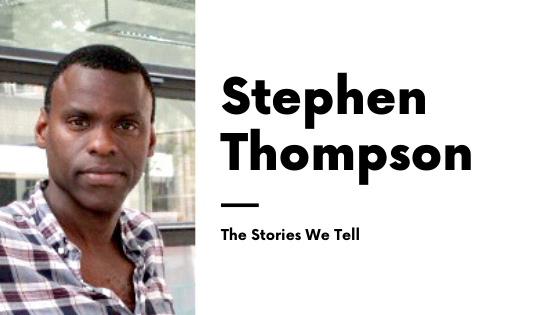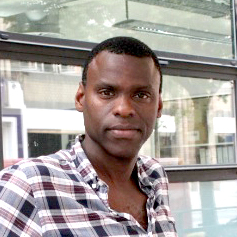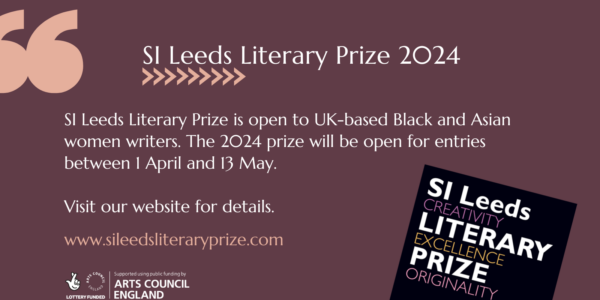Stephen Thompson – The Stories We Tell
01 Mar 2020 / The Stories We Tell

Speaky-Spokey
I decided to become a writer after reading A House For Mr. Biswas by V.S. Naipaul. It was the first novel I had read since leaving school, bought on the recommendation of a very persuasive second-hand bookseller, and long before I had finished reading it I knew what I wanted to do with the rest of my life. My desire to write was so strong it felt like a sickness. The only problem was I didn’t know what to write about. I had no stories. I was in rehab at the time, and when I mentioned this to one of the women working there, a bookworm on whom I had a crush, she suggested I write about my experiences of growing up on the mean streets of Hackney during the 1980s. I was unsure about this. I couldn’t see the sense in digging up what I was so keen to keep buried, but from a desperate need to get something down on paper, I began writing what eventually became my first novel, Toy Soldiers.
Around the same time, I enrolled on a twelve-week creative writing course at the Riverside Studios in Hammersmith. It had been suggested to me that I might benefit from being around other budding writers, and I didn’t think it could hurt to meet the tutor, Hanif Kureishi.
~ ~ ~
When I was growing up, the literary world seemed so far removed from my own as to be in a distant galaxy. No one I knew read books. There were no books in my house. The only writing I ever did was when I had to compose letters on behalf of my semi-literate mother. I loathed this task, seeing it as a gross imposition on my already limited free time, for while my friends were in the street playing football, I’d be stuck indoors taking dictation. I found it deeply depressing to hear Mum droning on about her troubles – many of them concerning my wayward behaviour – to our relatives back in Jamaica. Worse, I was always obliged to read out these depressing missives so that Mum could judge whether or not her thick patois had been adequately translated into standard English. Sometimes she found the letters to be too polished, the language a little too ‘speaky-spokey’, and she would ask me to tone them down a bit. This invariably set my teeth on edge, and if I eventually did the rewrite it was only after a lot of grumbling. Later, I came to realise that these were my first lessons in good penmanship: reading aloud, listening for discordant notes, redrafting. Unwittingly, Mum was preparing me for my future career.
~ ~ ~
I vividly recall my first impressions of Hanif Kureishi. I walked into the spacious rehearsal room on the first floor of the Riverside Studios to find him slouched on a chair, foot on knee, sipping a bottle of beer. Here, I thought, was a poseur par excellence. I took an immediate liking to him. For our first exercise, he told us to describe, in no more than a hundred words, something we did on a regular basis, preferably daily. The scintillating activities described ranged from making the bed, to feeding the cat, to greeting the postman. I remember one woman wrote earnestly about opening her curtains in the morning, and after she’d finished reading, the rest of us fell about laughing. Not with her, but at her. Her mistake was in trying to be too poetic, too lyrical. At the start of her piece, in a fit of alliteration, she described her curtains as long, light, lacy, and lilac. She was crushed by our cruel reaction and never came back. For what it’s worth, I wrote about waiting for a bus on a cold winter’s day, adding lots of detail about the other people waiting at the stop with me, about what was going on around us, and about that uplifting moment when your long-delayed bus is finally spotted on the horizon. My classmates gave it a cool reception, but I didn’t care: it was my first effort, written in haste, about nothing very much. Besides, it was Kureishi’s opinion that mattered, and he was very encouraging indeed. ‘You have an observant eye and a talent for concision.’ A few months later, he would say something similar about an embryonic version of Toy Soldiers.
~ ~ ~
I had a lot of time on my hands at rehab, so I decided to use it to plug the chasms in my reading. I was methodical in my approach. I joined my local library, and frittered away my fortnightly sickness benefit on used paperbacks. Poetry and short stories were out. I was only interested in the novel. I read like a man possessed, and at one point was getting through as many as four or five novels a month. I read everywhere: on the tube, on the bus, in my local park, in bed, on the loo, in the bath, and even, to the annoyance of my housemates, at the dinner table.
I came to appreciate the beauty and power of a well-written novel, and, after finishing one, would spend a few minutes turning it over in my hand, reading the blurb, the author biog, the reviews, delaying that moment when I would have to put it down and move on with my life. And all the while I was buying more and more of the things. Soon my tiny room at the rehab centre came to resemble a second-hand book repository, with paperbacks piled here, there, and everywhere. It gave me great pleasure to see my collection growing, and I would fantasise about all the new titles yet to be added. And the more books I bought, the happier I felt. Looking back, I can see that I had simply replaced one addiction for another, but where the one had almost killed me, the other was doing nothing so bad as expanding my mind, feeding my imagination.
Of course I was not only reading for enjoyment, but also as a means of becoming a better writer. In an effort to learn from the ‘professionals’, I set about deconstructing whole texts, making detailed notes as I went along, determined that I should know the difference between good and bad writing, between art and reportage. To be able to distinguish one from the other is not as straightforward as it might sound. I was in rehab for little over a year, and in that time, I read a great many bad books – but logic told me it was the only path to becoming a discerning reader. To get at the honey, one is obliged to handle the comb; even so, when I think about the hours I wasted, ploughing through books that are barely worth the paper they’re written on, I could weep from regret.
~ ~ ~
It took me ten years, off and on, to finish Toy Soldiers. A bildungsroman about a teenager trapped in a vicious cycle of crime and drug addiction, the book went through so many drafts, I believe I stopped counting after ten. There’s a world of difference between what I initially intended to write and what ended up being published. This, of course, is true of all books. It’s part of the writing process, and can be so exasperating. You conceive something, you write it in your mind, it’s a masterpiece – but try to get your original vision down on paper and you end up with what Zadie Smith describes as ‘a poor simulacrum, a shadow of a shadow’. I’m never satisfied with anything I write. Whenever I think of Toy Soldiers, I’m always reminded of its difficult birth. Ill-equipped for the mammoth task I had set myself, I struggled with everything: the form, the language, the length. I was a brazen mimic: now Hemingway, now Achebe, now Winterson. No matter how hard I tried I couldn’t make the thing stand up. Again and again it would come crashing down around my ears, and each time I’d begin the painstaking process of reconstruction. My housemates often commended me for sticking at it, but what they were putting down to dogged determination owed more, in fact, to obsession and even to masochism. The truth is I felt trapped. I could neither take pleasure in what I was doing nor give it up. And yet I’ll always be grateful for the experience, for this was undoubtedly my ‘apprenticeship’, the period in which I discovered exactly what it means to be a writer, and the lessons I learned have stood me in good stead ever since. All the same, if I had known at the outset what I found out subsequently, if I had known just how difficult writing can be, the chances are I might not have started at all.
~ ~ ~
When the writing class ended, I felt almost bereft. Thursday evenings would never be the same again. But I was not about to let our esteemed tutor ride off into the sunset and out of my life forever. As we stood having farewell drinks in the Riverside’s crowded bar, I asked Kureishi if he’d be interested in reading an excerpt from my novel-in-progress. To my surprise, he rewarded my effrontery not with a polite refusal, but with his phone number and address. I felt guilty for putting him on the spot in so public a fashion, for being so grasping, but the feeling quickly passed. (I’m nothing if not ambitious.) Months after I had sent him the material, Kureishi finally got back to me. His letter, which, naturally, I’ve kept, reads:
Stephen,
I read the material and was impressed. You write very well indeed; sharp, economical, to the point, with no decorative bullshit. The book needs developing, though. You need to open it out a bit, give us more stories of life in the rehab, add more characters. And we need more of a sense of Gabriel’s life before he left Hackney. The whole thing needs to be bigger. Keep working at it. Do that and you could have something very strong on your hands. In the meantime, I’ve sent the manuscript to Walter Donohue at Faber. He used to work at the Riverside, and encouraged me a lot when I first started writing. Give him a call. And let me know how things are progressing.
All the best.
Hanif.
Over the next few months, I had numerous meetings with both Donohue and Kureishi. They effectively held my hand as I undertook extensive revision on the book. I couldn’t believe my luck. No aspiring writer could ask for more. Strange as it may sound, at no stage did I believe Faber would publish the novel, but I kept at the revisions nonetheless, partly from a desire to finish, and partly because it gave me an excuse to keep in contact with Kureishi.
By this stage, I had left rehab and was living in a flat share, revelling, I must admit, in the image of the struggling, impoverished writer. I was signing on and doing odd jobs, and working on my novel whenever I could find the time. And then one I day I stopped. I had been working on the book for almost four years and simply fell out of love with it. This was a terrifying moment, for whilst the urge to write was as strong as ever, I was faced with the prospect of having to find a fresh subject. Whatever I eventually came up with, I knew one thing for certain: I would not write another novel, not for a while anyway. I had grown tired of the form and wanted to experiment with others. For a time I churned out short stories, then I wrote some truly awful poetry. After that I tried my hand at screenplays, but these were so derivative, looked and sounded like so many of my favourite films, that I soon gave up. Finally I turned to plays. To get feedback on my pieces, I joined the Royal Court Young People’s Theatre. I enjoyed my time there enormously. For the first time in my life, I discovered writers with similar levels of ambition (there’s that word again), but after two years I realised I wasn’t really cut out to be a playwright. This had less to do with the writing, which I enjoyed, and more to do with the collaborative process involved in getting the work from the page to the stage. Working with directors and actors, I felt pushed around, and sometimes side-lined altogether. In any case, I felt I owed it to myself to resume my abandoned novel, and it helped that Kureishi was continuing to show faith in it. And so I threw myself into the work with renewed vigour, determined not only to finish, but also to see the book published. It would take me another five years to achieve that goal. The experience was draining, and it made me determined to shorten process on the next book. The naivety!
Find out more about The Stories We Tell.
 Stephen Thompson was born in London to Jamaican parents. His first novel, Toy Soldiers, a heavily fictionalised account of his childhood, was published in 2000 and described by Hanif Kureishi as ‘beautifully written, painfully honest and deeply affecting’. His second novel, Missing Joe, was published a year later and concerns the generation of West Indians who arrived in Britain en masse during the post-war years. 2007 saw the publication of his third novel, Meet Me Under The Westway, a satirical account of life in London’s theatre land, drawn extensively from his experiences as a member of The Royal Court Young People’s Theatre. His most recent novel, No More Heroes, about the 7/7 bombings, was published in 2015. Away from writing novels, Stephen is the editor and publisher of the online literary journal, The Colverstone Review. He is also a screenwriter whose debut film, Sitting In Limbo, about the Windrush scandal, airs this summer on the BBC.
Stephen Thompson was born in London to Jamaican parents. His first novel, Toy Soldiers, a heavily fictionalised account of his childhood, was published in 2000 and described by Hanif Kureishi as ‘beautifully written, painfully honest and deeply affecting’. His second novel, Missing Joe, was published a year later and concerns the generation of West Indians who arrived in Britain en masse during the post-war years. 2007 saw the publication of his third novel, Meet Me Under The Westway, a satirical account of life in London’s theatre land, drawn extensively from his experiences as a member of The Royal Court Young People’s Theatre. His most recent novel, No More Heroes, about the 7/7 bombings, was published in 2015. Away from writing novels, Stephen is the editor and publisher of the online literary journal, The Colverstone Review. He is also a screenwriter whose debut film, Sitting In Limbo, about the Windrush scandal, airs this summer on the BBC.



